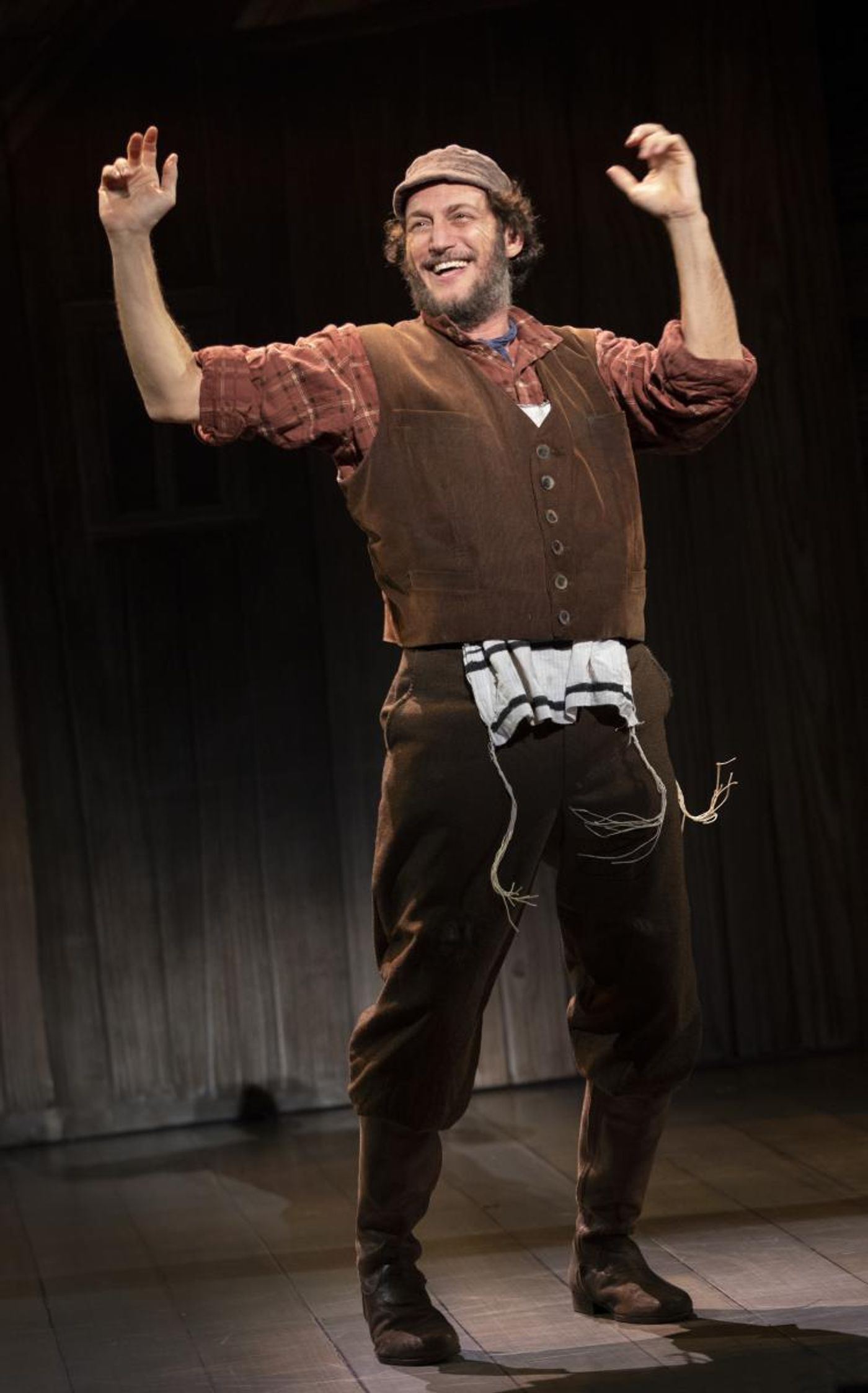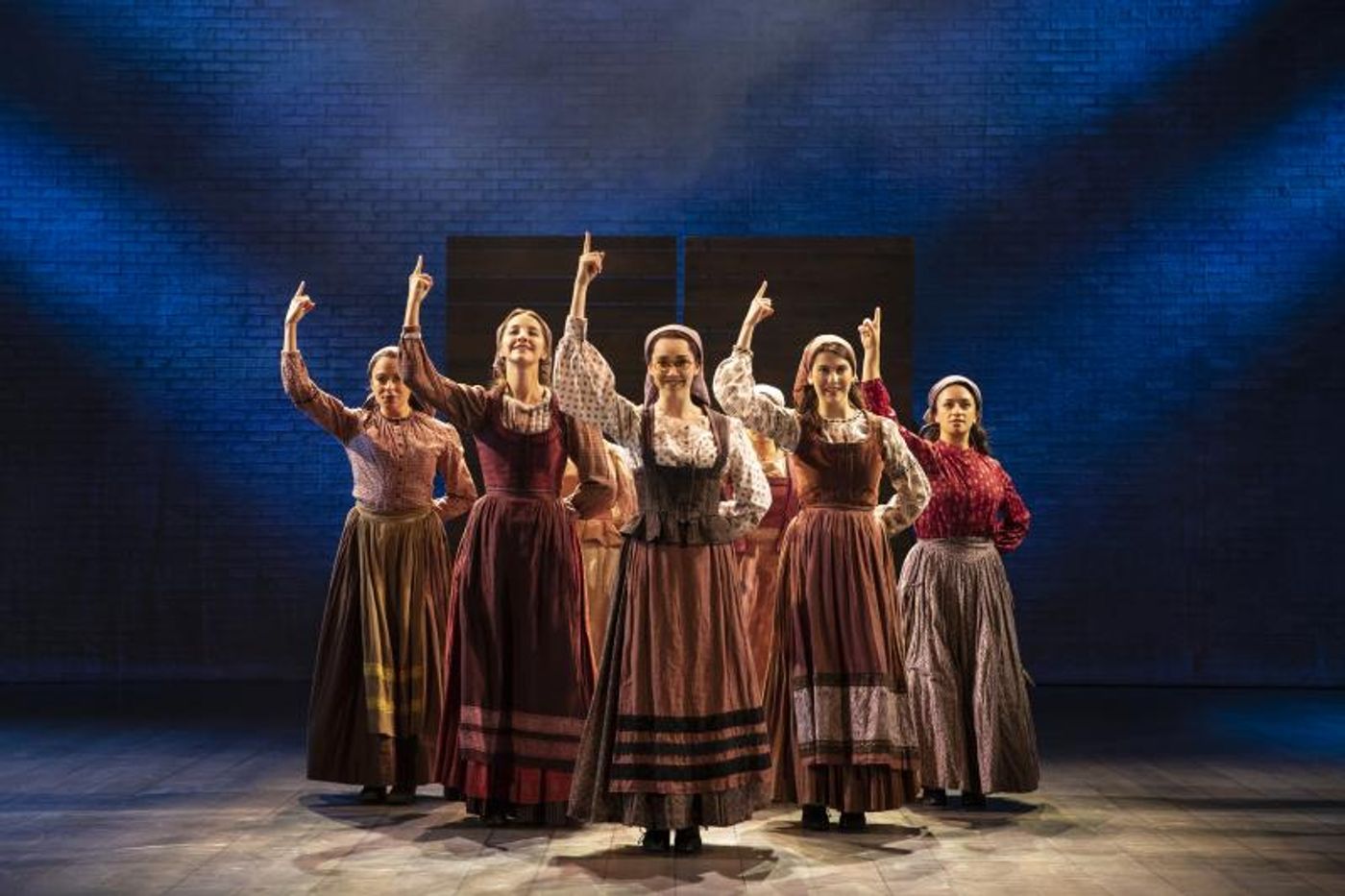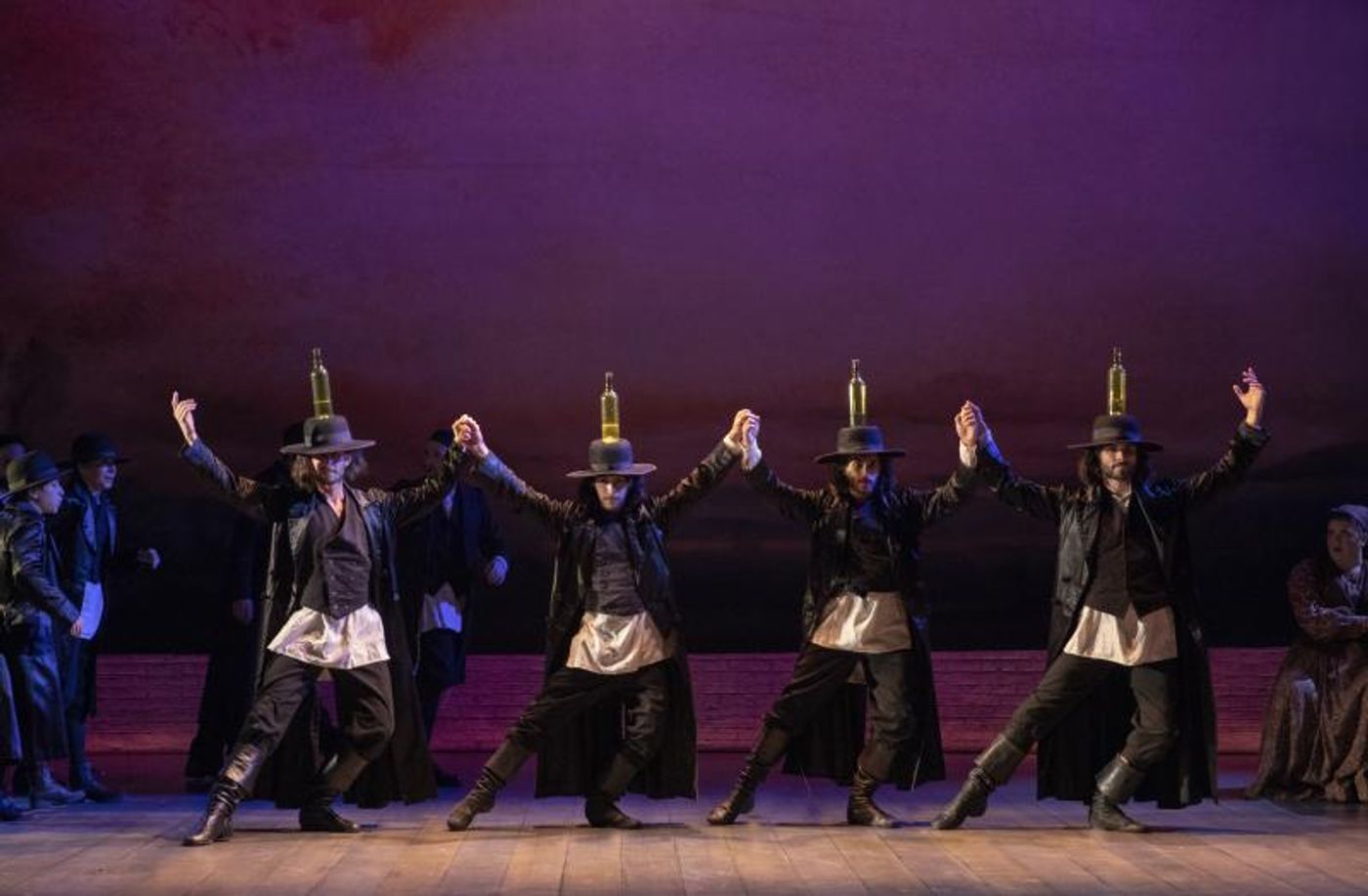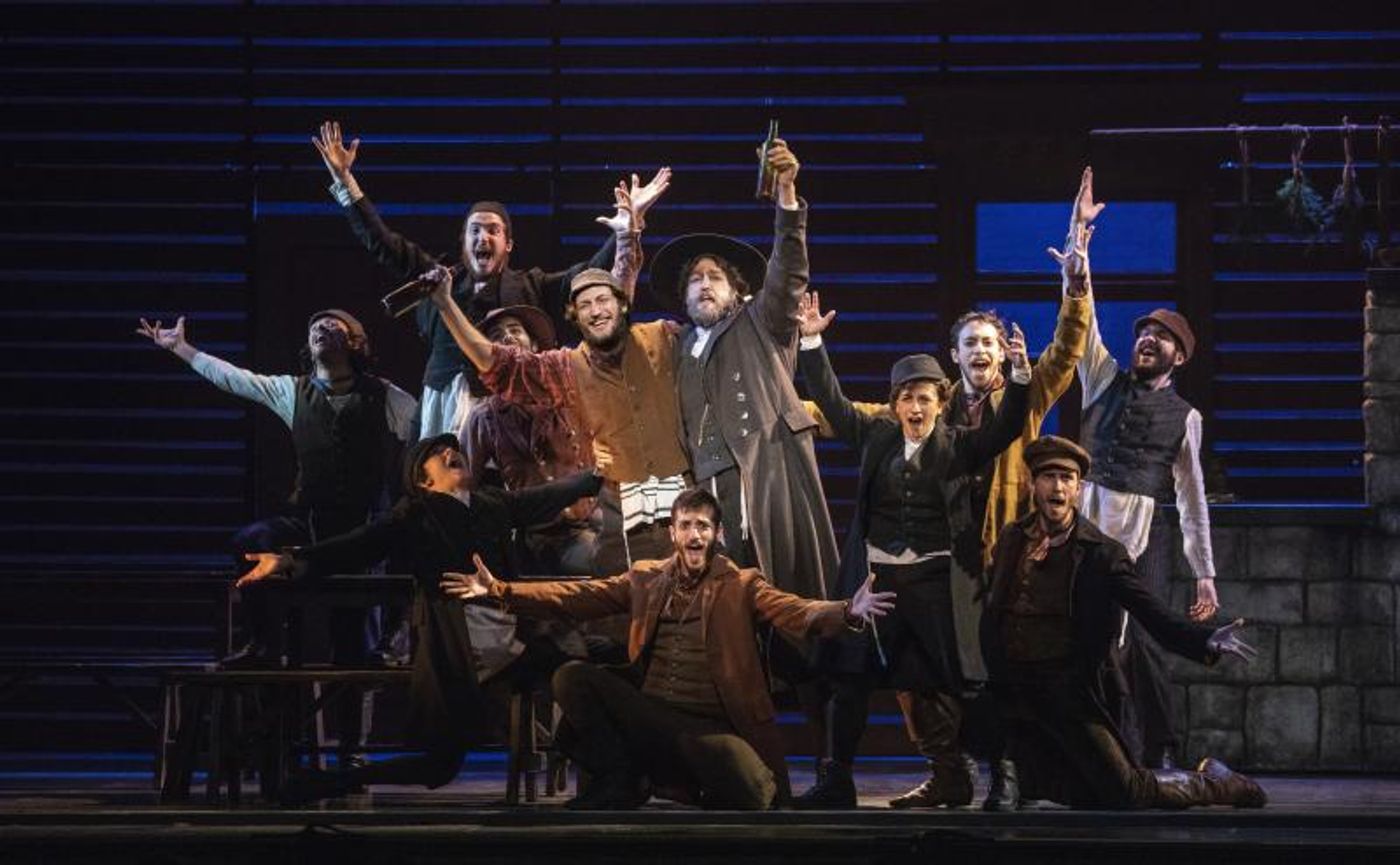Review: FIDDLER ON THE ROOF Proves Just as Vital and Engaging in 2019 as When it Debuted in 1964
 As I get older, I become more sentimental and the tears flow more easily when I am moved by something I experience or witness or read about or even see in a YouTube video. I come by my sensitivity naturally: my father, as difficult as he was to understand and comprehend in life, was often moved to tears by the most unexpected of things.
As I get older, I become more sentimental and the tears flow more easily when I am moved by something I experience or witness or read about or even see in a YouTube video. I come by my sensitivity naturally: my father, as difficult as he was to understand and comprehend in life, was often moved to tears by the most unexpected of things.
Why am I sharing all this personal information in a review of Fiddler on the Roof, the final production in the 2018-19 season of Broadway at TPAC? Because, gentle readers, the tears started to fall early (and frequently) during my viewing of the latest iteration of the iconic Broadway musical - with a book by Joseph Stein, music by Jerry Bock and lyrics by Sheldon Harnick, based upon the stories of Sholom Aleichem - brought to Nashville by the NETworks Presentations' national tour of the acclaimed 2015 revival on the main stem that has been criss-crossing the country ever since.
Fiddler on the Roof first debuted on Broadway in 1964 and in the intervening 55 years, it's become a beloved standard in the Broadway musical canon, being revived many times and performed on stages all over the world in productions both professional and amateur. The heartwarming tale of the world-weary dairyman Tevye, his long-suffering wife Golde, their five(!) daughters and their suitors and all of the other inhabitants of the Russian village of Anatevka has been delighting audiences ever since that initial mounting and rather than growing old and rather precious over time, Fiddler on the Roof instead has become even more relevant, particularly in the current socio-political climate in which immigrants have become political pawns and in which change is constant.
 So relevant is Fiddler on the Roof in 2019, in fact, that small and seemingly inconsequential events on opening night conspired to leave me awash in sentimentality and nostalgia. Moments before the lights went down in Andrew Jackson Hall in Nashville's Tennessee Performing Arts Center - where the show runs through Sunday, June 30 - a party comprised of a reporter for a local television station and three other handsome young men of the Broadway musical-loving variety, jostled past me to take their seats. I was struck by the fact that only 20 years ago, it would be unheard of for a local TV reporter to express even the slightest hint of loving musicals in public, a point I made to two friends during intermission. That progress, however incremental it may be, nonetheless is encouraging and heartening.
So relevant is Fiddler on the Roof in 2019, in fact, that small and seemingly inconsequential events on opening night conspired to leave me awash in sentimentality and nostalgia. Moments before the lights went down in Andrew Jackson Hall in Nashville's Tennessee Performing Arts Center - where the show runs through Sunday, June 30 - a party comprised of a reporter for a local television station and three other handsome young men of the Broadway musical-loving variety, jostled past me to take their seats. I was struck by the fact that only 20 years ago, it would be unheard of for a local TV reporter to express even the slightest hint of loving musicals in public, a point I made to two friends during intermission. That progress, however incremental it may be, nonetheless is encouraging and heartening.
Returning to my seat, I remarked to the young man on my right that I thought I'd heard singing coming from their quarter during Act One. "It was these three queens," he said, pointing to his compatriots. "Trust me, you don't want to hear me sing!" Another of the men pointed to the aforementioned TV reporter and said, "This one was far more 'hummier' than me." We laughed and shared one of those sweet and too infrequent moments among strangers that often bring people together.
The fact that only days earlier Nashville had celebrated its largest-ever Pride celebration was not lost on me: Fiddler on the Roof may be about Jewish peasants dispossessed and forced out of their homes by Tsarist Russian policies prior to revolution 100-plus years ago, but its overriding message of embracing change amid much cultural upheaval is perhaps more prescient today than ever before. When Tevye, the beleaguered and poor milkman who loves his family dearly and with every fiber of his being, turns away from his daughter, Chava, when she falls in love and chooses to make a life with Fyedka, a well-meaning and progressive-thinking gentile, I was reminded of the countless young LGBTQ+ individuals enduring the same rejection from their families today.
 If a musical comedy, albeit one with dramatic, even tragic, overtones can suggest parallels between people of both the fictional and real-life varieties and can compel audiences to think about how their own life stories reflect the same issues faced by fictionalized characters, then its writers have succeeded far beyond their imaginations - and the relevance of a show that premiered on Broadway in 1964 becomes even more deeply felt. The power of live theater to transport its audiences, to challenge preconceived notions and to present a picture of a world only once imagined is inspiring and thrilling.
If a musical comedy, albeit one with dramatic, even tragic, overtones can suggest parallels between people of both the fictional and real-life varieties and can compel audiences to think about how their own life stories reflect the same issues faced by fictionalized characters, then its writers have succeeded far beyond their imaginations - and the relevance of a show that premiered on Broadway in 1964 becomes even more deeply felt. The power of live theater to transport its audiences, to challenge preconceived notions and to present a picture of a world only once imagined is inspiring and thrilling.
Sholom Aleichem's stories of his life in Russia may have, at some point in time, seemed questionable fodder for a musical theater masterpiece - yet that is exactly what has happened in the half-century since Fiddler on the Roof became a hit. Today's audiences benefit from the scholarship of countless writers who have, over the years, sought to interpret Fiddler on the Roof for their contemporaries, but today it's clear to me what the show is about: love of family and love of place, the importance of home and a shared experience and the power of the human heart to accept and to adapt to the change happening every second of every day of every year since time began. Set all that to a Jerry Bock score, which melds together European/Old World traditions with the very best of Tin Pan Alley and the particular idioms of musical theater? For me, that's a dream come true.
This production of Fiddler (directed on Broadway by Bartlett Sher and featuring the choreography of Hofesh Shechter) is eminently watchable and enormously engaging. Bookended by the presence of a contemporary fellow reading from a volume of Aleichem's collected works, the tale's resonance is quickly realized, drawing audiences instantly into the tale as it plays out before them onstage. Sher's direction is fluid and cinematic in nature as one scene dovetails perfectly into the next, energized by Shechter's exquisite movement (his "Bottle Dance" is spectacularly performed by the multi-talented ensemble) which moves the story along with a graceful ease that belies the physicality of the choreography and the earnestness of the storytelling.
 The visual design aesthetic for this revival is stunning: Michael Yeargin's set design beautifully captures the time and place of the stories told (set pieces glide smoothly on and off to create a make believe world crafted into something real and tangible), while Catherine Zuber's gorgeous costumes give the cast an able assist in creating their memorable characters and Donald Holder's eye-popping lighting design casts an evocative light on the proceedings that is at once dramatic and rather matter-of-fact.
The visual design aesthetic for this revival is stunning: Michael Yeargin's set design beautifully captures the time and place of the stories told (set pieces glide smoothly on and off to create a make believe world crafted into something real and tangible), while Catherine Zuber's gorgeous costumes give the cast an able assist in creating their memorable characters and Donald Holder's eye-popping lighting design casts an evocative light on the proceedings that is at once dramatic and rather matter-of-fact.
Yehezkel Lazarov's take on Tevye is perhaps different from any you may have seen prior - he's younger and more physically commanding than some of the broken-down old men previously seen as Tevye, and he performs with a vigor that ensures the audience watches with rapt attention as his tale unfolds. Maite Uzal is wonderfully droll and self-assured as Golde, his equally hardworking wife and mother to their five daughters. The chemistry between the two is palapable and their performance of "Sunrise/Sunset" delivers an emotional impact that is surprising in its sheer power.
 As Tzeitel, their oldest daughter, the lovely Mel Weyn is ideally paired with Jesse Weil as Motel, the tailor, while Ruthy Froch (as Hodel) is likewise appropriately linked to Ryne Nardecchia as Perchik. Finally, Natalie Powers (as Chava) is partnered with Joshua Logan Alexander (talk about a theatrical name with historic portent) as Fyedka. Each young couple makes grand use of their time in the spotlight as they plead their cases for acceptance and recognition among the family and their village.
As Tzeitel, their oldest daughter, the lovely Mel Weyn is ideally paired with Jesse Weil as Motel, the tailor, while Ruthy Froch (as Hodel) is likewise appropriately linked to Ryne Nardecchia as Perchik. Finally, Natalie Powers (as Chava) is partnered with Joshua Logan Alexander (talk about a theatrical name with historic portent) as Fyedka. Each young couple makes grand use of their time in the spotlight as they plead their cases for acceptance and recognition among the family and their village.
Among the sizable and impressively talented ensemble of actors are Jonathan von Mering who's terrific as Lazar Wolf, with Carole Beaugard as the acerbic and funny Yente, Michael Hegarty as the Rabbi and Nick Siccone as his son, while Carolyn Keller and Olivia Gjurich very nearly steal the show as Golde's grandmother and Fruma Sarah during an especially vivid fever dream sequence. Finally, Jeff Brooks (who previously stole the show in the tour of Bullets Over Broadway as a tap-dancing gangster) creates an indelible impression as the Constable, whose sense of duty overcomes his sense of honor in a pair of especially dramatic scenes.
Fiddler on the Roof. Book by Joseph Stein. Music by Jerry Bock. Lyrics by Sheldon Harnick. Based on the Sholom Aleichem stories by special permission of Arnold Perl. Original direction by Bartlett Sher. Original choreography by Hofesh Shechter. Choreography recreated by Christopher Evans. Musical direction by Michael Uselmann. At Tennessee Performing Arts Center, Nashville. Through Sunday, June 30. For details, go to www.TPAC.org or call (615) 782-4040. Running time: 3 hours (with one 15-minute intermission).
photos by Joan Marcus
Reader Reviews
Videos

